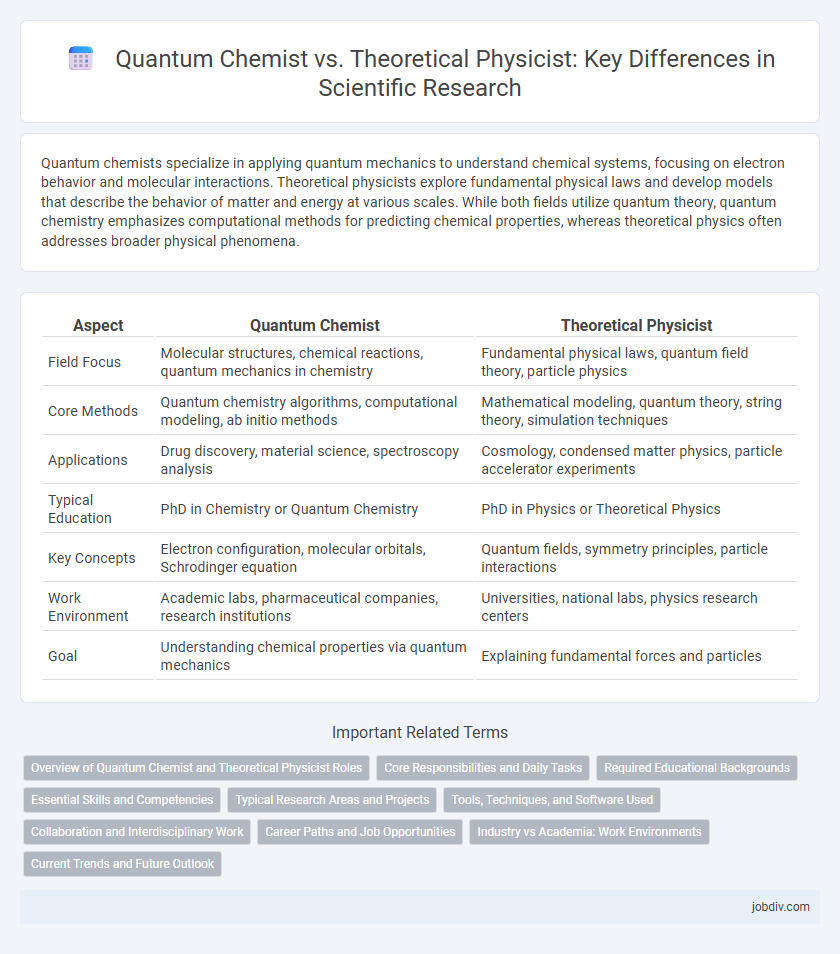Quantum chemists specialize in applying quantum mechanics to understand chemical systems, focusing on electron behavior and molecular interactions. Theoretical physicists explore fundamental physical laws and develop models that describe the behavior of matter and energy at various scales. While both fields utilize quantum theory, quantum chemistry emphasizes computational methods for predicting chemical properties, whereas theoretical physics often addresses broader physical phenomena.
Table of Comparison
| Aspect | Quantum Chemist | Theoretical Physicist |
|---|---|---|
| Field Focus | Molecular structures, chemical reactions, quantum mechanics in chemistry | Fundamental physical laws, quantum field theory, particle physics |
| Core Methods | Quantum chemistry algorithms, computational modeling, ab initio methods | Mathematical modeling, quantum theory, string theory, simulation techniques |
| Applications | Drug discovery, material science, spectroscopy analysis | Cosmology, condensed matter physics, particle accelerator experiments |
| Typical Education | PhD in Chemistry or Quantum Chemistry | PhD in Physics or Theoretical Physics |
| Key Concepts | Electron configuration, molecular orbitals, Schrodinger equation | Quantum fields, symmetry principles, particle interactions |
| Work Environment | Academic labs, pharmaceutical companies, research institutions | Universities, national labs, physics research centers |
| Goal | Understanding chemical properties via quantum mechanics | Explaining fundamental forces and particles |
Overview of Quantum Chemist and Theoretical Physicist Roles
Quantum chemists specialize in applying quantum mechanics principles to understand molecular structures, chemical reactions, and material properties, utilizing computational methods to model electronic behaviors. Theoretical physicists develop conceptual frameworks and mathematical models to explain physical phenomena across various scales, often exploring fundamental forces and particles. Both roles intersect in quantum theory but diverge in focus, with chemists concentrating on molecular systems and physicists addressing broader universal laws.
Core Responsibilities and Daily Tasks
Quantum chemists primarily focus on modeling molecular interactions and chemical reactions using quantum mechanics principles to predict molecular properties and behaviors. Their daily tasks often involve computational simulations, developing algorithms for electron structure calculations, and analyzing spectroscopic data. Theoretical physicists concentrate on formulating mathematical models to explain fundamental particles and forces, frequently engaging in abstract problem solving and validating theories through complex equations and experimental data.
Required Educational Backgrounds
Quantum chemists typically require a strong foundation in chemistry, physics, and mathematics, often holding a PhD in quantum chemistry or physical chemistry with specialized coursework in quantum mechanics and molecular modeling. Theoretical physicists usually pursue advanced degrees such as a PhD in physics, emphasizing quantum theory, particle physics, and mathematical methods. Both fields demand extensive research experience and proficiency in computational techniques relevant to their areas of study.
Essential Skills and Competencies
Quantum chemists possess advanced knowledge in quantum mechanics, computational modeling, and chemical systems, excelling in skills such as molecular simulation, algorithm development, and data analysis related to chemical properties. Theoretical physicists demonstrate strong expertise in mathematical physics, abstract reasoning, and problem-solving, specializing in formulating physical models and analyzing fundamental forces and particles. Both fields require proficiency in high-level mathematics, programming languages like Python or MATLAB, and critical thinking to address complex scientific challenges.
Typical Research Areas and Projects
Quantum chemists typically focus on molecular simulations, electronic structure calculations, and reaction mechanism modeling to understand chemical phenomena at the quantum level. Theoretical physicists investigate fundamental forces, quantum field theory, and particle physics, often developing mathematical models to explain physical laws and predict experimental outcomes. Both disciplines employ advanced computational methods, but quantum chemistry emphasizes chemical systems while theoretical physics targets broader physical theories.
Tools, Techniques, and Software Used
Quantum chemists primarily use computational chemistry software such as Gaussian, ORCA, and Q-Chem to model molecular structures and reactions at the quantum level. Theoretical physicists rely on mathematical modeling tools like Mathematica, MATLAB, and simulation frameworks for quantum field theory and particle physics calculations. Both fields employ high-performance computing clusters and programming languages like Python and C++ for numerical analysis and algorithm development.
Collaboration and Interdisciplinary Work
Quantum chemists and theoretical physicists frequently collaborate to advance understanding of atomic and molecular systems by combining quantum mechanics with computational models. Their interdisciplinary efforts integrate chemical bonding theories and physical principles, enabling precise simulations of complex interactions at the quantum level. This synergy accelerates discoveries in material science, spectroscopy, and nanotechnology through shared methodologies and optimized problem-solving techniques.
Career Paths and Job Opportunities
Quantum chemists specialize in applying quantum mechanics to chemical systems, focusing on molecular modeling and computational simulations, which opens opportunities in pharmaceuticals, materials science, and chemical industries. Theoretical physicists explore fundamental principles of nature, often engaging in research related to particle physics, cosmology, or condensed matter, with career options in academia, national laboratories, and advanced technology sectors. Both career paths require strong analytical skills and mathematical expertise, but quantum chemists typically work in chemistry-focused environments while theoretical physicists operate in broader physics research domains.
Industry vs Academia: Work Environments
Quantum chemists often operate within academic research institutions or pharmaceutical companies, applying quantum mechanics to molecular and chemical systems to innovate drug design and materials science. Theoretical physicists typically work in universities or government labs, developing mathematical models to understand fundamental physical phenomena and support advancements in fields like particle physics or cosmology. Industrial roles for quantum chemists emphasize practical applications and experimental validation, whereas theoretical physicists focus more on abstract modeling and computational simulations, often in academic settings.
Current Trends and Future Outlook
Quantum chemists increasingly utilize machine learning algorithms to enhance the accuracy of molecular simulations, pushing the boundaries of chemical reaction modeling. Theoretical physicists focus on unifying quantum mechanics and general relativity, with quantum gravity research gaining momentum through approaches like loop quantum gravity and string theory. Emerging interdisciplinary collaborations bridge quantum chemistry and theoretical physics, leveraging advances in quantum computing to address complex problems in both molecular systems and fundamental physics.
Quantum Chemist vs Theoretical Physicist Infographic

 jobdiv.com
jobdiv.com